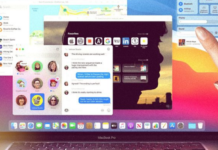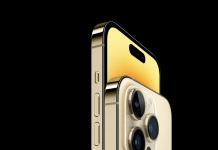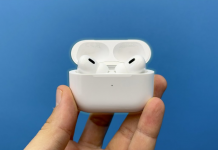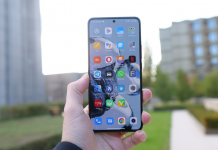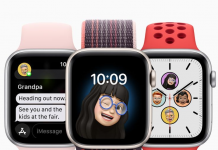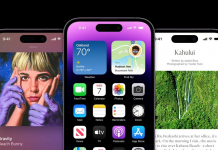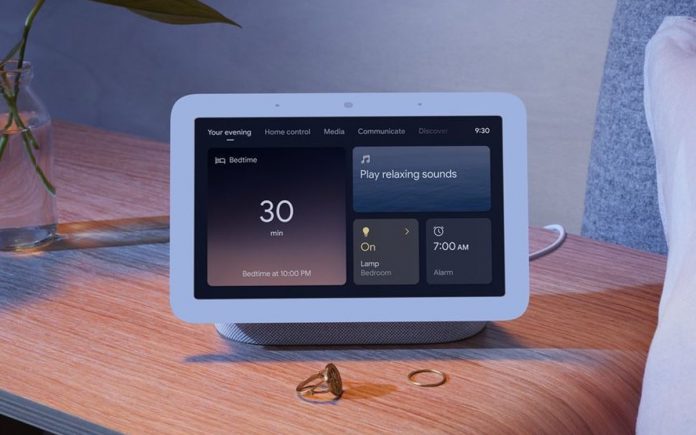Google has just launched a new Nest Hub. This new connected speaker is distinguished by the presence of a Soli sensor, the same radar as the Pixel 4 and Pixel 4 XL. Thanks to this gesture detector, the Nest Hub is able to analyze the sleep of its owner. Unfortunately, this option will pay off after one year of use. The speaker is already available for pre-order at a price of 99.99 euros.
Google has just announced a new generation of Nest Hub. Visually identical to the Nest Hub we tested, this new edition is built around a 7-inch touchscreen (1024 x 768) and a speaker. With this one, you’ll be able to interact with Google Assistant with the voice. Google claims to have improved sound rendering by increasing bass by 50%.
Like the previous model, the connected speaker allows you to listen to music on Spotify, YouTube Music and others, watch videos on the screen, or display photos in the manner of a digital photo frame. The new Nest Hub, however, brings several significant new features compared to its predecessor. First of all, the machine is compatible with Thread, a protocol that allows to create a mesh network for all connected objects (bulbs, doorbells, sockets …) of your home home. Next, Google integrates a new chip to improve the responsiveness of the Google Assistant. The same component can be found within the Nest Mini.
Read also: Google improves Nest Hub interface to control vacuum cleaners, locks and shutters more easily
Nest Hub offers paid sleep tracking tool after 12 months
Most importantly, the new Nest Hub features the Soli gesture detector found on the Pixel 4. Absent from the following Pixels, the radar makes its big return on the connected speaker. It is therefore possible to control the speaker (launch or stop content during the drive) by making gestures with your hands. It is no longer necessary to summon the Google Assistant for each query.
This Soli sensor allows the Nest Hub to analyze the quality of your sleep. Located near your bed, on a nightstand or dresser, the Nest Hub can use Motion Sense to keep an eye on your sleep. By analyzing your body’s movements and breathing during the night, the connected speaker can provide a detailed record of the quality of your sleep.
According to Google, the Soli sensor is able to identify disruptive events that interfere with your sleep,such as a snoring, cough or light rail filtering through the curtains. The Mountain View firm ensures that all this data is stored and processed locally. No information is sent to remote servers. However, Google allows you to manually delete certain records to reassure users. Note that the Nest Hub doesn’t carry any cameras, as Google probably wants to prevent users from feeling spied on in their bedrooms.
When you wake up, the Nest Hub will offer a brief summary of your night inthe Google Fit app, just like the apps that accompany wristbands connected with a sleep tracking system. This summary will show your full sleep time and recorded disturbances. The Soli sensor can only analyze sleep one person at a time. Of course, sleep analysis is optional. Google invites the user to activate this option via the screen interface. When the Soli detector is working, an indicator appears on the screen.
Beware, this sleep tracking feature pays off. To appeal to users, Google will nevertheless offer a free trial year. So far, the Mountain View giant has not disclosed the price of this monthly subscription. One imagines that this rather unexpected approach may put off some users and we regret that the flagship novelty of this second generation is offered via subscription.
Released on March 30, 2021 in France at a price of 99.99
The speaker joins Nest Mini and the Nest Hub Max, which we tested, in Google’s catalog of connected speakers. The new Nest Hub will be released on 30 March 2021 in France at a price of 99.99 euros. The connected speaker is already available for pre-order at Fnac, Boulanger and Darty.
As always, Google offers two different colors: pebble and charcoal. What do you think of Google’s new connected speaker? We are waiting for your opinion in the comments below.








